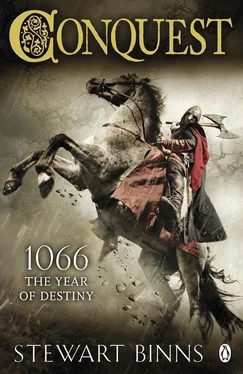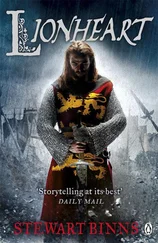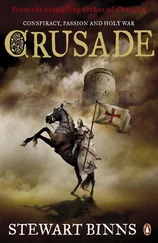It took Hereward only a few minutes to walk from Edgar’s tannery to the abbey. Blood flowed down his arm, and his face was blackened by soot and etched with scarlet burns, but he did not falter. He almost ran across the cloister of the abbey, avoiding the beautifully decorated stone crucifix in the centre of the crosswalk. It was deserted except for a few benches lining the quadrangle to facilitate prayer and contemplation.
Hereward threw open the heavy wooden door of the Great Hall. At one end, a huge fire spat flames towards the blackened roof timbers high above and filled the air with woodsmoke. There were several armed monks in the shadows, two more stood by the Abbot, along with his man-at-arms. They looked like Normans, with their distinctive chain-mail armour and nose-guard helmets.
The Abbot was a man to behold: his robes were a rich fawn, like chamois leather, and around his neck a heavy chain held a glistening gold crucifix, encrusted at its four corners by large rubies. He did not move, nor even look up, as Hereward made his dramatic entrance; he seemed to be in meditation, staring at the Scriptures that lay before him on the pages of a beautifully decorated Bible. Apart from his ostentatious garb, he had the appearance of a devout man of God: he was clean-shaven, had tonsured, cropped hair and the stern face of an ascetic. His left hand rested on the Holy Book, his right was hidden from view beneath the table; Hereward assumed it held a dagger. Silence reigned for a moment as the young thegn of Bourne surveyed the scene.
‘Do close the door; Ely’s winter chills me to the bone.’ The Abbot spoke in the clear, precise tone of an educated cleric practised in speaking down to congregations. ‘The usual arrangement is to make an appointment with my clerk.’
Hereward did not respond.
The Abbot still did not move his head, nor glance up from the page. ‘Do you read the Holy Scriptures?’
Again, Hereward said nothing.
‘You should. Let me read to you from the Book of Revelation of St John the Divine: And when he had opened the fourth seal, I heard the voice of the fourth beast say, Come and see. And I looked, and behold a pale horse: and his name that sat on him was Death, and Hell followed with him .’ Finally, the Abbot looked up.
This brought an instant response from Hereward. ‘You are right; I bring Hell with me, Thurstan, Abbot of Ely. I intend to take you to Leofric, Earl of Mercia. There I will ask that you be tried for murder before the King. If you resist, I will kill you.’
Thurstan smiled. He looked down at the Scriptures once more. ‘You misunderstand. Let me continue: And power was given unto them over the fourth part of the earth, to kill with sword, and with hunger, and with death, and with the beasts of the earth . You see, I am Death. I have the power of the sword and the beasts of the earth are mine… I think you have already felt my power… and met my beasts.’
‘Your beasts are no more. They have felt my power.’
Thurstan’s face turned to anger for the first time. His demeanour suddenly became vicious, contorted and cruel.
Now Hereward recognized his enemy, the kind of man who could, without a hint of remorse, order the murder of a woman in cold blood.
‘You are a naïve boy. The Beast is legion; however many you kill, there will be multitudes more. Look around you.’
With that, Thurstan’s men stepped forward from the gloomy shadows of the hall and drew their swords. More than ten yards and the formidable obstacle of a large refectory table separated Hereward from Thurstan. However, without hesitation or regard for the impossibility of the odds, Hereward leapt on to the end of the table and raised his battle-axe. Almost immediately, the blades of the nearest swords slashed at his legs and he had little choice but to hurl his axe in an attempt to impale his quarry.
Hereward had practised the technique for many months. It was a close call, but Thurstan moved just enough to his left so that the wide blade of the axe missed his head and smashed into the back of the ornate oak chair he was sitting on. Nevertheless, his evasive movement, downwards and to the left, had raised his right shoulder enough for the blade to tear into his flesh and shatter his collarbone. As soon as Hereward realized that his axe had made a mark, he somersaulted from the table in an attempt to find a space within which to defend himself. But his legs were weak from the lacerations they had already received and, as soon as he hit the ground, he collapsed into a heap.
Thurstan’s men rushed towards him, poised to hack him to death.
‘Hold!’ Thurstan bellowed with as much volume as the deep gash to his shoulder would allow. The whole of the upper right-hand part of his robe was already dyed crimson from his wound. He sat motionless; even the slightest movement, in an attempt to extricate himself from the axe, cut deeper into his flesh. ‘Remove this confounded axe before it cuts me in two!’
Without hesitation, two of the Abbot’s warrior priests stepped forward. While one held Thurstan’s upper body, the other levered the axe upwards out of the deep gouge it had made in both the flesh and bone of its target and in the solid oak of the chair. The wood screeched as the blade was prised from it, but could not mask Thurstan’s howls.
‘This petulant son of Bourne is dripping blood all over my floor. Bring him here, hang him from the roof.’
Hereward was bound by the wrists and hoisted off the ground by a rope cast over the bracing piece of the roof’s massive cruck beam. He had numerous sword wounds to his legs and buttocks; he could not feel some of the toes on his left foot, and blood was rapidly draining out of him. He was left to hang like a carcass in a smokehouse, and a large spit pan was placed under his feet to catch the blood that seeped from his legs.
One of the priests made an all-too-apparent observation to Thurstan. ‘My Lord, your wound is deep. You too are losing much blood; I’m afraid you will have to bear the hot iron.’
‘I know that, you fool! Prepare me.’
A hot poker was thrust deep into the fire. As they waited for it to attain the deep-red glow of a branding iron, Thurstan was stripped to the waist and placed on the table. Two men held a leg each; two more stood on either side, holding his arms with their weight on his chest, while a fifth knelt on the table behind him and pulled his face away from his stricken shoulder. The deed was quickly done. As the iron sank deep into the Abbot’s shoulder, the wound sizzled and a cloud of pungent smoke carried the stink of burning flesh into the air.
After a while, unconsciousness spared Thurstan any further suffering and he was carried away to his bedchamber.
It was late evening before the Abbot reappeared in the hall. He was ashen-faced, grimacing with pain and able to stand only with the support of two men.
‘Is he alive?’
‘I’m not sure, my Lord. I think his blood is all but drained from him.’
‘Let’s see if a hot iron can rouse him.’
Hereward had lost consciousness some hours earlier, but now he could feel a dull pain. He did not have much feeling in his legs, and his head was jammed backwards by his arms. He could see only the dark beams of the roof and the flicker of firelight in its rafters. He could hear muffled shouts echoing in the distance and felt as if he were floating.
His strongest sensation was the smell of roasting meat; he could remember the hot iron on Thurstan’s wound and the sickening scent of scorched human flesh. Then he realized where he was and what was causing the pain: this time, the flesh being seared was his.
Thurstan had just enough strength to lift his left arm and prod the glowing red poker into Hereward’s wounds. As soon as the steam of the blistering flesh carried away the iron’s potency, Thurstan ordered that it be quickly reheated.
Читать дальше












